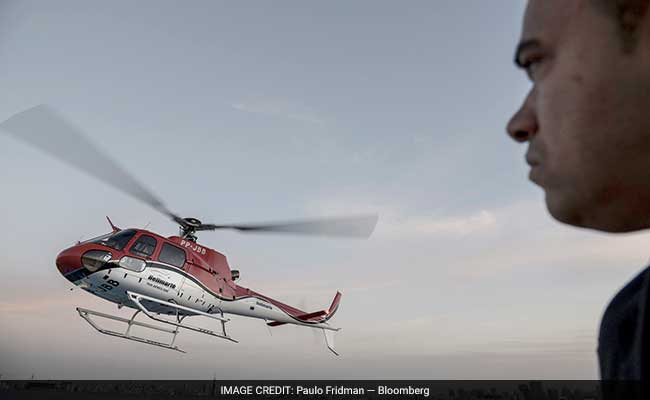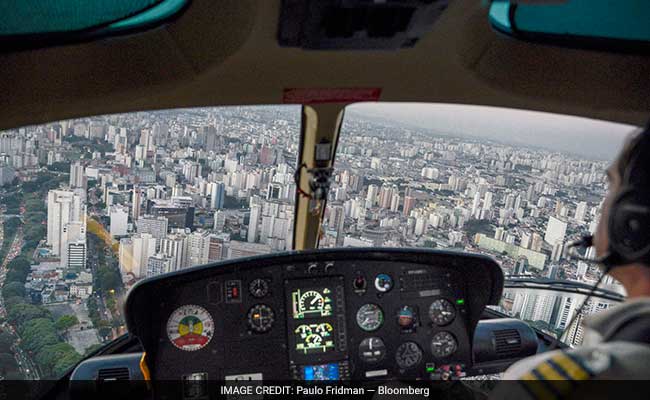
A passenger prepares to board an UberCopter. (Paulo Fridman, Bloomberg)
The thunderous chop of helicopter blades echoes from the glassy facades of skyscrapers as top bank executives return from weekend beach jaunts. The ear-splitting migration is heard most Sundays in the financial district of Sao Paulo, South America's biggest metropolis. But if Uber has its way, helicopter commutes will no longer be exclusively for Brazil's most elite financiers.
The San Francisco-based ride-hailing company has chosen Sao Paulo, Brazil's congested financial hub of 20 million people, to test its helicopter service, appropriately named UberCopter. The company has toyed with helicopters during events such as the Cannes Film Festival, but Sao Paulo represents the first time UberCopter has gone live full-time, according to Gui Telles, Uber's Brazil manager.
The city is fertile ground for experiments in urban mobility. Gridlock is rampant, traffic jams can stretch for hundreds of kilometers, and the country is in the midst of an auto boom, thanks to tax incentives from President Dilma Rousseff. The excessive number of cars gives Uber a large pool from which to draw willing drivers. Despite early scuffles between Uber drivers and local taxi unions, Brazil is set to eclipse Mexico as the top market in Latin America for the company. It may get a further boost if the city decides to allow the use of public transport travel cards for Uber rides.
 Uber in the skies works in much the same way as Uber in the streets.
Uber in the skies works in much the same way as Uber in the streets.
I opened up my Uber app and selected the UberCopter option. The app even gives users the ability to share helicopter rides with others going their way, similar to UberPool. An UberX driver wearing black sunglasses picked me up. The UberCopter concierge called three times during the drive to coordinate my departure from the helipad. I was dropped at an air taxi company whose website markets "heligourmet" trips to the beach for 2,400 reais ($707). A receptionist served me espresso in a spacious lounge with plush couches until a porter grabbed my bags and whisked me into the helicopter.
It took about 15 minutes for clearance, a minor drawback for someone on deadline but not nearly as agonizing as Sao Paulo traffic. The "paperwork" was minimal - I punched in a few personal details in two minutes in the app on my smartphone.
Once airborne, the flight from Campo de Marte in northern Sao Paulo to the Guarulhos International Airport took 10 minutes and cost 211 reais ($63), plus 30 reais ($9) for the car ride from house to helipad, or about twice what the trip would have cost by cab alone. The same trip in a cab, however, could have taken an hour or two in rush-hour traffic.
 UberCopter won't always make sense. In my case, I could've made it to the airport in less time at lower cost if I had grabbed a cab.The helicopter could probably save time for people who live or work in neighborhoods with a high concentration of helipads, such as the financial district.
UberCopter won't always make sense. In my case, I could've made it to the airport in less time at lower cost if I had grabbed a cab.The helicopter could probably save time for people who live or work in neighborhoods with a high concentration of helipads, such as the financial district.
Nonetheless, the service might make sense for Uber. It turns out that Sao Paulo has a glut of helicopters, not just cars, and an oil bust has meant less work for air taxi companies that cater to the oil industry. The average helicopter is used 400 hours per year but has capacity for 2,000 hours, meaning that Uber has room to quintuple usage without adding a single helicopter to its 400-strong fleet, according to Uber's Telles.
Early signs indicate demand can fill at least some of those available hours. My pilot said he had already shuttled too many Uber users to count. Telles said the program, which Uber launched in partnership with Airbus, has already attracted strong demand.
Uber announced last week that customers could catch rides among four airports and five heliports around the city for promotional prices of as little as 66 reais ($20). Critics have accused the company of offering the service at an unsustainable discount, but Telles says that isn't the case.
"We are always looking for the best price which is sustainable for partners and helicopter owners," Telles said. "The helicopter taxi industry has been around and idle here for ages, and we are just using technology to make better use of it."
Taking a helicopter is seen by most Brazilians as an ostentatious display of wealth. For a few bucks a ride, however, this luxury for the mega-rich may quickly lose some of its standing a status symbol.
© 2016 Bloomberg L.P.
(This story has not been edited by NDTV staff and is auto-generated from a syndicated feed.)
The San Francisco-based ride-hailing company has chosen Sao Paulo, Brazil's congested financial hub of 20 million people, to test its helicopter service, appropriately named UberCopter. The company has toyed with helicopters during events such as the Cannes Film Festival, but Sao Paulo represents the first time UberCopter has gone live full-time, according to Gui Telles, Uber's Brazil manager.
The city is fertile ground for experiments in urban mobility. Gridlock is rampant, traffic jams can stretch for hundreds of kilometers, and the country is in the midst of an auto boom, thanks to tax incentives from President Dilma Rousseff. The excessive number of cars gives Uber a large pool from which to draw willing drivers. Despite early scuffles between Uber drivers and local taxi unions, Brazil is set to eclipse Mexico as the top market in Latin America for the company. It may get a further boost if the city decides to allow the use of public transport travel cards for Uber rides.

A security officer looks on as an UberCopter lands at the Blue Tree Hotel Heliport in São Paulo. (Paulo Fridman, Bloomberg)
I opened up my Uber app and selected the UberCopter option. The app even gives users the ability to share helicopter rides with others going their way, similar to UberPool. An UberX driver wearing black sunglasses picked me up. The UberCopter concierge called three times during the drive to coordinate my departure from the helipad. I was dropped at an air taxi company whose website markets "heligourmet" trips to the beach for 2,400 reais ($707). A receptionist served me espresso in a spacious lounge with plush couches until a porter grabbed my bags and whisked me into the helicopter.
It took about 15 minutes for clearance, a minor drawback for someone on deadline but not nearly as agonizing as Sao Paulo traffic. The "paperwork" was minimal - I punched in a few personal details in two minutes in the app on my smartphone.
Once airborne, the flight from Campo de Marte in northern Sao Paulo to the Guarulhos International Airport took 10 minutes and cost 211 reais ($63), plus 30 reais ($9) for the car ride from house to helipad, or about twice what the trip would have cost by cab alone. The same trip in a cab, however, could have taken an hour or two in rush-hour traffic.

An UberCopter flies above São Paulo. (Paulo Fridman, Bloomberg)
Nonetheless, the service might make sense for Uber. It turns out that Sao Paulo has a glut of helicopters, not just cars, and an oil bust has meant less work for air taxi companies that cater to the oil industry. The average helicopter is used 400 hours per year but has capacity for 2,000 hours, meaning that Uber has room to quintuple usage without adding a single helicopter to its 400-strong fleet, according to Uber's Telles.
Early signs indicate demand can fill at least some of those available hours. My pilot said he had already shuttled too many Uber users to count. Telles said the program, which Uber launched in partnership with Airbus, has already attracted strong demand.
Uber announced last week that customers could catch rides among four airports and five heliports around the city for promotional prices of as little as 66 reais ($20). Critics have accused the company of offering the service at an unsustainable discount, but Telles says that isn't the case.
"We are always looking for the best price which is sustainable for partners and helicopter owners," Telles said. "The helicopter taxi industry has been around and idle here for ages, and we are just using technology to make better use of it."
Taking a helicopter is seen by most Brazilians as an ostentatious display of wealth. For a few bucks a ride, however, this luxury for the mega-rich may quickly lose some of its standing a status symbol.
© 2016 Bloomberg L.P.
(This story has not been edited by NDTV staff and is auto-generated from a syndicated feed.)
Track Latest News Live on NDTV.com and get news updates from India and around the world

